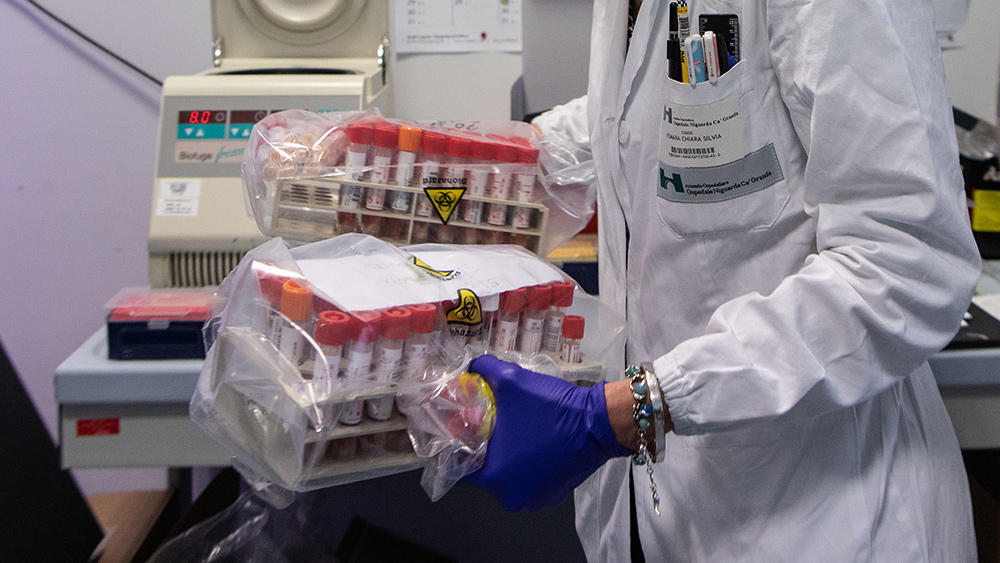Pfizer’s mobile science brainwashing truck targets children with “escape-room-like” vaccine production simulation
09/13/2024 / By Cassie B.

Pfizer has become more blatant than ever in pushing vaccines on the masses with an absurd new mobile science brainwashing truck that convinces young people that their toxic jabs will somehow save humanity. It targets children aged 9 to 14 and boasts “a scientific adventure like no other.”
In a promotional video, students in a rural North Carolina town can be seen taking part in what Pfizer calls the “School of Science Mobile Experience,” where a Pfizer robot dog greets them and interacts with them.
The brainwashing truck promises a “fantastic, interactive, escape-room-like experience,” and as much as we’d all like to escape from any room where people are pushing untested vaccines on us, the idea here is that vaccines are the solution to a worrying pandemic outbreak that leaves people with lizard-like skin.
During the exercise, children are taught various “lessons” in the scary trailer’s assorted rooms. For example, one teaches about vaccine manufacturing, while another explains the concepts of antigens. They also get the opportunity to meet Pfizer employees through the School of Science, even though we doubt this ranks on any child’s list of idols they’d like to meet one day.
The North Carolina students ultimately “successfully produced a remedy that will be distributed around the world” in the simulation, according to the promotional video, and we suspect it has more than a few similarities to the company’s highly profitable COVID-19 vaccines.
Pfizer accused of directly marketing vaccines to children
One educator accused the pharmaceutical company of shilling its vaccines to young people via the truck, with New York city educator and Teachers for Choice founder Michael Kane stating: “It’s definitely crossing a line from education to directly marketing or promoting their products to kids. It just feels so wrong.”
A North Carolina parent, Beth Secosky, told The Defender that Pfizer should not be teaching science to children. She pointed out: “Pfizer has paid billions in penalties for false claims and safety violations. Why would schools invite a corporation that is notorious for putting profits over people to teach their children ‘science’?”
Pfizer working hard to inculcate the next generation of customers
The mobile brainwashing unit is part of the Pfizer School of Science, which has hosted middle school students at the pharmaceutical giant’s New York City headquarters, where they are subjected to 90-minute “courses” about subjects such as vaccine history, drug manufacturing, immunology and the use of artificial intelligence in healthcare, with Pfizer footing the bill. They also hear pitches from employees about future careers with the company.
CEO Albert Bourla claims that more than 6,000 students from New York City with “diverse backgrounds” have gone to its headquarters for these programs, writing on LinkedIn that they go out of their way to brainwash as many young people as possible.
“In some cases, this meant modifying our coursework to accommodate diverse needs, such as customizing classes to suit different learning abilities and language capabilities,” he wrote.
They’ve been pushing hard to appeal to younger generations in recent years, celebrating their version of “science” not just with their School of Science but also in a Super Bowl ad that aired in January with famous scientists singing along to the Queen hit “Don’t Stop Me Now.”
At the time, their chief marketing officer, Drew Panayiotou, boasted that the “iconic Queen song … cuts across generations with the words ‘don’t stop me now,’ which is a great line for Pfizer.”
Considering the record-breaking profits they earned thanks to the COVID-19 vaccines that were forced on so many people around the world, it won’t be surprising if Pfizer goes even further moving forward in their bold efforts to brainwash future generations of vaccine and drug customers.
Sources for this article include:
Submit a correction >>
Tagged Under:
Big Pharma, brainwashed, campus insanity, conspiracy, education system, evil, indoctrination, outrage, Pfizer, pharma fraud, propaganda, public education, school, science deception, science fraud, Twisted, vaccine wars, vaccines
This article may contain statements that reflect the opinion of the author




















